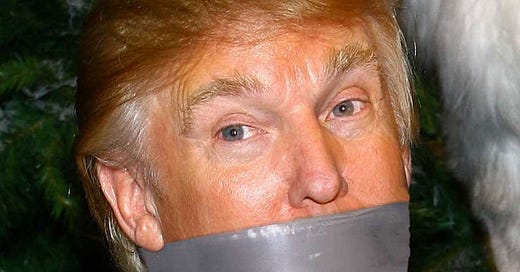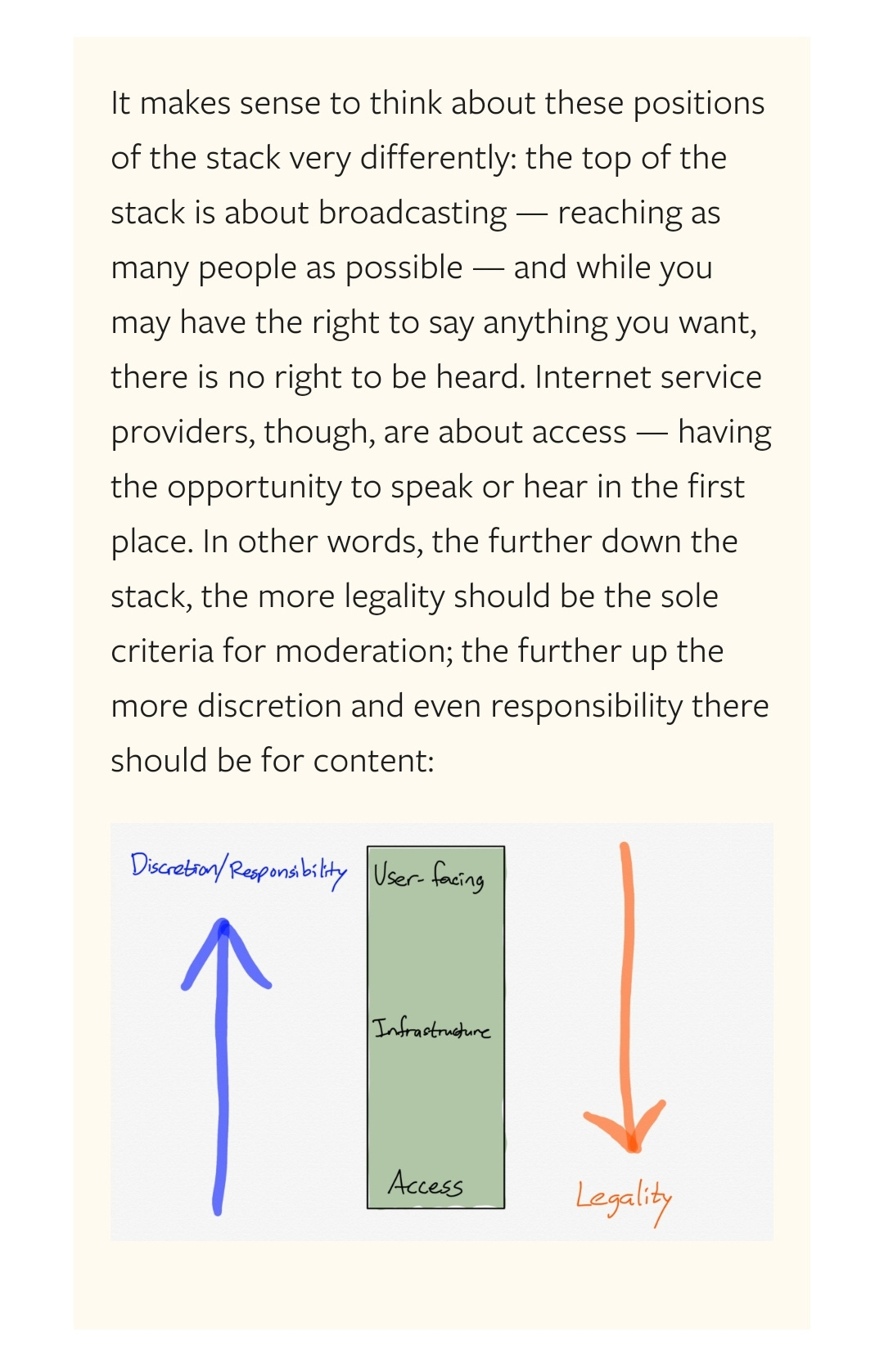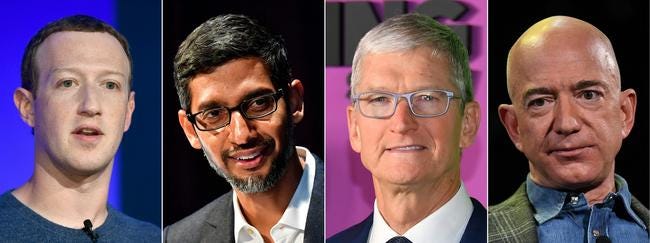Twitter was wrong to ban Trump
The problem isn't Trump - it's America's culture, politics and technology industry.
How do we determine what we ‘should’ do in any circumstance?
Generally, when confronted with a moral choice, at a high level we tend to take one of two approaches.
We consider the expected outcomes by some measure that we personally determine as mattering, and then we make what we believe to be the difficult, but correct moral decision (e.g. “I will euthanise my dog to reduce its suffering”).
We follow the set rules that society has determined to define morality (the law, or obvious norms). Do not lie, do not kill, treat others with kindness & respect... in this case protect basic liberties such as free speech.
The vast majority of the time, these two don’t clash, so we can intuit what to use when no strong rule applies, or the rule is obvious.
The difficulty is when they rub up against each other ... Do I tell a painful truth when a white lie will suffice? Can I commit assault to stop a criminal? Should I tell my partner about my cheating knowing it will only hurt them?
Fundamentally, we determine morality by outcomes. Rules and laws factor into this, but they are not inherently moral themselves. Most have come to exist because we believe they promote the common good. They help prevent people doing things that tend to have negative consequences for society.
Similarly, the law itself is not black and white. We don’t defend freedom of speech because it is good in and of itself, but because it allows different ideas to spar and resolve to the best outcomes in the mid-term.
When there’s risk of this not being the case, it is reasonable to apply limitations; for example, suppressing “fake news” and “anti-vax” information during Covid. The most ardent defender of free speech should also, in theory, defend all fake news, except that which explicitly incites violence (and therefore breaks the law).
As such, no rule is categorical. It will always have caveats. Even the concept of free speech, which we hold very dear, has its limits. An argument of the need to enshrine it cannot overcome the fact that Trump literally incited chaos and convinced his followers to attack the seat of the government on January 8th. He also seeks to cause chaos on the 20th of January.
In light of this, the argument goes that the slight potential damage to the norm of free speech is worthwhile to avoid damage to the norm of peaceful democracy, law and order. Besides this, we are removing Trump from the platform of a private media company who has every right to decide their own terms.
On the face of it, the move seems prudent and justifiable.
However, before we jump to the conclusion that banning Trump was fine, let’s think about how we got here, and ask some questions…
Will permanently censoring the Donald serve the job intended?
Is it the best moral decision?
Does Twitter have the right to decide who is allowed to use their platform, like a normal company, or is there a logical reason they are different?
How did we get here? And will banning Trump solve this, or make it worse?
The Big Tech Problem
I saw a good tweet a couple of days ago that said “In China, the state controls the media. In America, the media controls the state.”
In his excellent book “The Master Switch”, Tim Wu outlines the ways in which technology empires rise and fall. His central gambit: companies that control information tend to become fewer over time, and their monopolies eventually become so large that they need to be regulated or nationalised.
This is, of course, the situation we now find ourselves in. The argument that Twitter is a private media company who can decide who and what they publish is a straw man. Thanks to network effects, the likes of Twitter and Facebook are more like public utilities than companies. They control all the information distribution. I like Ben Thompson's framework for thinking about this problem:
However, I disagree with Ben's contention that Twitter / Facebook are higher up this stack. Although they are consumer facing, such is the nature of their dominance that these companies are de facto access providers, more like the cables that relay information than the TV channels that publish it. Companies like the New York Times are publishers, and they use multiple channels (mediums of information transfer) to relay their messages…mediums like email, paper and Twitter.
If you control information distribution at this level, you control society.
There has been a lot of talk about this recently in the US, as you likely know.
It is, therefore, not a coincidence that tech companies started censoring Trump the moment they saw the Biden administration taking over.
Twitter could have found an excuse to boot Trump off their platform long ago, but they didn't. Why? Because their share price rose thanks to the increased activity he generates. It helped improve their grip over information, the commodity they mine and trade. Fake news and contentious content gets more engagement. An ad based business model, reliant purely on engagement, optimises for posts about the sort of conspiracy theories and hate mongering that created the mob outside the Capitol.
Pretending that Twitter removed Trump (and that Apple, Google and Amazon cooperated to shut down Parler) simply out of some noble mission to defend democracy is naive. They're currying favour with the Democrats to avoid regulation and push back the discussion of the elephant in the room… the fact that their product design and business model rewards the behaviour that helped give birth to Trumpism and QAnon in the first place.
Trump is more an effect than a cause…
But Big Tech is one half of a two-piece jigsaw. The the other piece of the puzzle is race.
Race In America
Nativism is older than Trump. Although after Timothy McVeigh the far right (American white supremacism) did go into decline, the rise of Trump belongs in this broader context.
Lyndon Johnson’s civil rights act of 1964 was the true beginning of universal suffrage in America and the start of what we call "multi-racial democracy". But even then, a controlling stake in the country’s public life was held by white persons. This was a controlling stake which has for decades been protected by anti-democratic means: voter suppression, gerrymandering, and electioneering. In fact, the very electoral college itself is structurally favourable to the old ‘slave states’. The continuation of this structurally imbalanced system affirms the birthright of the passengers of the Mayflower - white people.
Trump’s time in office coincides with a crisis for those who wish to affirm that mindset. The multi-racial democracy promised in 1964 is now coming of age, with demographic changes. Georgia has turned blue and Texas, with its 38 electoral college votes, is soon to follow. As the balance of political power changes, so too does tolerance for structural inequality. Movements to remove some of these legacies of structural inequality inflame the fear and panic of those white folks who firmly believe, consciously or subconsciously, that the US is the sole inheritance of white persons.
Alex Danco noted this in his excellent piece “Secrets About People: A Short and Dangerous Introduction to Rene Girard.”:
“Part of the reason why Trump appeals to a lot of Americans, I think, it’s that Trumpism is based on the idea that a forced flat society does not work. It’s not unfair to characterize Trumpism as a rejection of the last couple decades of policy and rhetoric that have advanced, more or less, the agenda that “everybody is equal and the government is going to actively make sure that everyone is treated the same.” Trumpism, to me, can be summed up as a rejection of the idea that we are and ought to be undifferentiated. This is a very Girardian mindset.”
Trump’s movement and his tweets are an invocation to a last stand and a counter-revolution. His most ardent follower is the man who feels rage at the sight of Colin Kaepernick asserting his demand not to be trodden on by his country, all while the Gadsden flag flies on his front porch. This is not borne of ignorance. It is borne out of a consistent belief that he is a real citizen, to whom the USA is accountable, and Kaepernick is not.
These opinions were long ago defeated. They hold no sway with a rational thinker. This is why those persons lean towards violence.
But in censorship, Twitter threaten the cause of freedom they claim to defend. Censoring Trump provides his people with further evidence to justify violence and continue to market their outlandish claims about the Deep State, Democrats eating babies and whatever other incoherent nonsense is shilled out to them by wackos and Russian troll farms.
And let’s be clear… most of them don't believe this nonsense, even if they claim to. It just helps them support their real motives. What would be useful is to put the people who broke the law last week in prison, without question, if they have broken the law and committed an imprisonable offence. Conspiracies like QAnon (and voter fraud) thrive on collective belief. Collective belief vanishes pretty quickly when it is met with hard realities. You can convince people not to believe in gravity, but their belief will quickly disappear when they're standing at the top of a cliff.
Likewise, Trump should simply be impeached for breaking the rules. We have legal frameworks for these situations, without Twitter's help.
Shutting down Trump and people like him is not the answer. Let their lunacy exist in the clear light of day and their lawbreaking behaviour be met with swift justice. Otherwise, we risk emboldening them and strengthening their arguments.
What’s more, although it is true that a thought-controlled people are more easily united, it also leads to civilisational ossification, to the suppression of new ideas and of innovation in technology, culture and policy.
Conclusion: Trump is not the problem
The strategic move tech monopolies made in deplatforming him permanently and destroying Parler was as much about cosying up to the Biden administration as it was about defending the “Land of the Free”.
This is because the Democrats now have to begin thinking about how to regulate Big Tech, and sort out the mess they have knowingly made of people’s brains over the last 15 years. Jack Dorsey himself has acknowledged that the Trump ban sets a dangerous precedent, and was the lamentable result of their “failure to promote healthy conversation”. I recognise that he is pushing to find solutions to this problem, but Jack is now but a cog in Twitter’s machine.
I concede that there was a clear logic to temporarily removing Trump from his podium. The true moral decision was probably to deplatform him for a few weeks, in order to stop his mob from wrecking the place. Sort of like shutting off someone’s water for not paying their bill. He was a naughty boy, he needed a scolding. Moreover, he will now face legal recourse for his misbehaviour, as he should.
As for the subject of race, and protecting the people threatened by Trump’s most die-hard supporters, I have this to say:
To create conditions on what persons may say online gives too much credit to the ridiculous ideas being espoused by dinosaurs of American society. Dinosaurs who already find themselves staring up at the meteor heading straight for them.
P.R., with M.A. and A.C.
Many thanks to Anthony Collias and Mohammed Ahmed, who debated this topic at our last community event and contributed written content to this article. Thank you also to other Odin Community members who contributed ideas.
Further Reading / Listening
📰 Jump - Mike Solana
📰 Trump and Twitter - Ben Thompson
📰 Secrets about People: A Short and Dangerous Introduction to René Girard - Alex Danco
📰 The Electoral College’s Racist Origins - Wilfred Codrington III
📰 The Real Class War - Julius Krein
🎧 America’s Political Precipice & the Hyperreality of Markets - Grant Williams & Ben Hunt
Go Deeper
📰 The Hidden Author of Putinism - How Vladislav Surkov invented the new Russia - Peter Pomarantsev
📺 Hypernormalisation - Adam Curtis
📚 The Master Switch - Tim Wu
📚 War and peace and war: The life cycles of imperial nations - Peter Turchin







